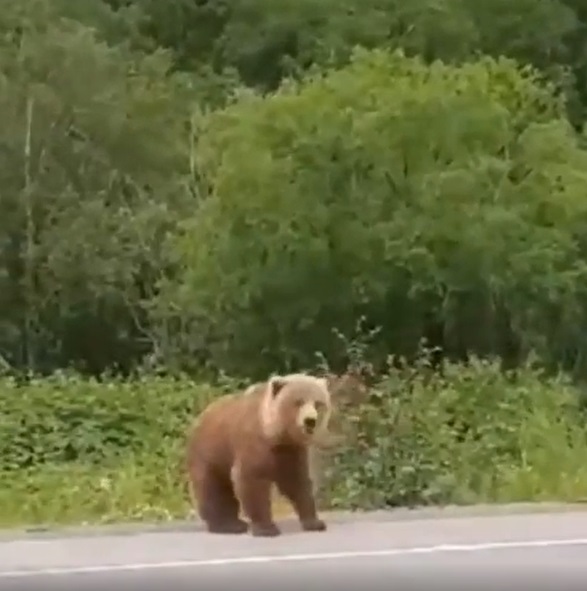When it comes to close calls with dangerous wildlife, it doesn't get much closer than jumping on top of a vehicle to escape a charging bear.
In a shocking video shared to r/Whatcouldgowrong, a man is seen attempting to hand-feed an adolescent brown bear on the side of the road. The man gets as close as about 5 feet from the bear before it charges him. Just when the bear is close enough to cause serious harm, the man jumps onto the roof of his car.
But the video doesn't end there. A few moments later, the man jumps down from the top of his car — the bear still just a few feet away. Instead of getting into the safety of his vehicle and leaving the bear be, he whips out a phone and begins filming the creature.

"Some people just have a death wish," one person commented of the reckless behavior.
Unfortunately, instances of humans dangerously encroaching upon wildlife are alarmingly frequent. In the past month, The Cool Down has reported multiple occurrences of people getting too close and too comfortable with wildlife, including sea lions, moose, and coyotes, to name a few — and these are just the ones caught on film.
In many cases, those filmed in these situations are able to escape unharmed, but the same can't always be said for the wildlife.
This is especially true for bears, who are frequently euthanized after their behavior leads to confrontations with humans.
Like humans, bears are creatures of habit. In the wild, bears will frequently return to locations where they have hunted or scavenged for food before. Similarly, bears that have been fed by humans or have eaten human food will habitually return to those same neighborhoods, campgrounds, or dumpsters until the food runs out or they are euthanized.
To protect wildlife in the delicate ecosystems they inhabit, it is important to enjoy them from a distance and listen to rules put in place by governing authorities, like park rangers.
Disregarding these guidelines not only causes undue stress to wildlife but also places added responsibility on park rangers, whose duty is to safeguard both visitors and the delicate ecosystem.
Moreover, engaging in risky behavior contradicts one of the fundamental goals of national parks: to deepen visitors' understanding of the natural world and instill a desire to protect it. National parks serve as crucial havens for preserving natural resources, maintaining biodiversity, and providing awe-inspiring landscapes for current and future generations to cherish.
To ensure that national parks remain accessible and enjoyable for all, it's imperative to respect and adhere to the established rules while appreciating the presence of wildlife within these remarkable environments.
Commenters on the Reddit post remarked on the ignorance and foolishness of those who approach wildlife so carelessly.
"The only reason he's still alive is because the bear is probably not hungry, and it was a bluff charge and not one to hunt," one person speculated.
"Not a smart thing to do," someone else wrote.
"People will do anything for internet points, except respect wildlife," said another person.
Join our free newsletter for cool news and cool tips that make it easy to help yourself while helping the planet.









